Magazine
The Tragedy of Waste Bengal
Jayant Chowdhury
Apr 06, 2016, 05:23 PM | Updated 05:23 PM IST
Save & read from anywhere!
Bookmark stories for easy access on any device or the Swarajya app.
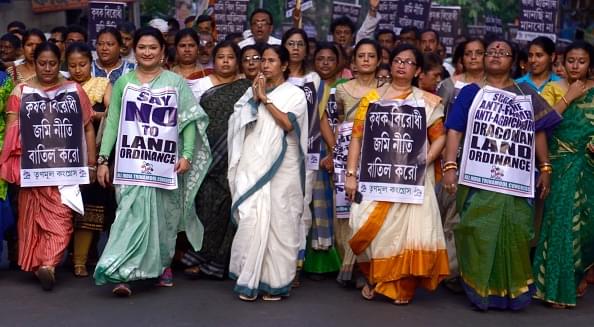
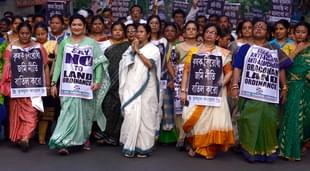
For 34 years since 1977, the CPI(M)-led Left Front in Bengal did everything it could to bring the state to ruination. They succeeded to a large extent.
Over the past five years since 2011, Mamata Banerjee has happily tried to complete that unfinished and ignoble task. And she has been quite successful at it—the tattered economy that she inherited has only gone southwards, the administrative mess that the Communists left behind has only been compounded with her abysmal lack of governance skills, all the institutions that the Communists skillfully subverted have deteriorated under her watch, and the politics of intolerance and vengeance that the Left practiced have only been carried forward by her.
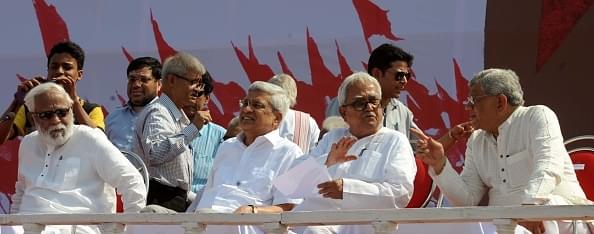
Overall, the West Bengal of today is perhaps worse off than the state that her predecessor, Buddhadeb Bhattacharjee, left for her.
The Left Legacy
The Left, true to its nature and its ideology, was intolerant of any opposition—political, social, ideological and intellectual. Thus, it went about decimating all opposition in a systematic manner. Political opposition it tackled in a brutal manner—intimidation, assaults, rapes and murders became the order of the day. Workers and supporters of opposition parties—the Congress and the Trinamool—were hounded out of their homes and villages and had to stay away for months and years at a stretch.
The election process was subverted by a variety of tactics ranging from manipulation of electoral rolls, intimidation and threats, to booth capturing and violence to scare away voters. Violence and gore became an inalienable part of the political narrative in Bengal.
Intellectual and social opposition was tackled a little more subtly through a well laid out system of rewards and retributions. Academic institutions, right from primary schools to universities, and scientific and research and development bodies, were packed with Left supporters and sympathizers. The space for contrary views and ideologies was snuffed out; history textbooks were rewritten to spread toxic Communist philosophy.
Students in schools and colleges were taught to idolize Communist ideologues like Lenin, Stalin and Mao, and this insidious indoctrination into Communist thought ensured the supply of a steady stream of youngsters into the party fold. This brainwashing also ensured that the ranks of government officials from the peon to the senior officer were filled with the party faithful. Those not falling in line, be it in the bureaucracy or academia, were banished.
However, all this the Left did with some amount of finesse and subtlety. For the simple reason that not only were many in the Left party apparatchik educated and intelligent, but the CPI(M) party machinery was also very elaborate with a well-defined chain of command and clearly chalked out responsibilities. Also, Left cadres were a disciplined lot. That was the distinct advantage the Left had over the current ruling dispensation in Bengal.
Mamata’s Brute Tactics
Mamata Banerjee, who, to be fair, lays no claims to being an intellectual, has few people of intellect and intelligence around her. The academic accomplishments of her entire cabinet would not even fill the pages of a pocket notebook. But since assuming the reins of office, she decided to emulate her predecessors and rule the state with an iron hand.
Unfortunately, her attempt to emulate the tactics of the Left turned into very ham-fisted ones, thanks largely to her—and her adjutants’—utter lack of subtlety. Also, the Trinamool party has no clear structure and chain of command. Mamata, ever distrustful of people around her, has all powers concentrated in her hands. Her senior colleagues have no clearly defined roles and all posts in the party are ad hoc. They serve at the mercy and pleasure of Mamata, who is known to heap verbal abuse publicly on even her seniormost colleagues for even minor transgressions, real or imagined.
Indiscipline and factionalism is rife in and clashes between different factions is routine and has claimed a few lives as well. Worse still, most of the Trinamool’s foot soldiers are goons, lumpens and petty criminals who used to make up the army of criminals and musclemen of the Left and simply switched loyalties when the political winds in Bengal started blowing in Trinamool’s favour.
While the Left had them under its firm control, the Trinamool, given its lack of a clear command and control structure, along with factional rivalries and lack of management skills, has failed to exercise effective control over these foot soldiers. Consequently, these goons have been indulging in extortion and other petty crimes that have adversely affected the common man.
Mamata’s inability to control her party-men and cadres has wreaked havoc on the state. Crimes, especially petty crimes like pick-pocketing, chain-snatching, robberies and house-breaks have increased phenomenally. This is because the police cannot act against petty criminals who owe allegiance to the Trinamool. Mamata has to depend on them to establish and enforce the might of her party and intimidate voters during elections, so she cannot have the police acting against them.
One of the biggest menaces in Bengal today is the syndicates of suppliers of building construction materials. All the members of such syndicates, without exception, are Trinamool cadres and builders, and even individuals constructing their own homes, are forced to source inferior quality building materials from these syndicates at higher prices.
Even the very few investors in Bengal are not spared: they are forced by such syndicates to not only source materials from them to set up factories, but also to recruit labourers and, once the factory starts running, workers from them. Without the intelligence, the acumen, governance skills, lack of achievements on the ground and a strong party machinery to ensure victories in elections, Mamata has had to appease all sections of the people, including criminals, by giving them a free hand to commit crimes in exchange for their support to win elections mainly through foul means.
The Left also had little to show in terms of achievements, but their strong party machinery had ensured seven successive poll victories. Mamata has to compensate for her acute disadvantage in this critical area by patronizing petty criminals.
The Absence Of Any Ideology
The Trinamool Congress, for whatever it is worth, is bereft of any ideology, principles and policies. The “Ma, Maati, Manush (Mother, Land, People)” slogan of Mamata and her party is as vacuous as Bengal’s politics over the last four decades. Given this lack of ideology, all who are in the Trinamool today, from the lowest cadre to the seniormost cabinet minister, are in the party only for power and pelf.
Mamata knows this only too well and, despite her protestations about personal honesty, is in no position to prevent her partymen from indulging in rampant corrupt practices. She knows that if she cracks down on corruption, her partymen, including her closest aides, would abandon her. That—the prospect of losing power—is unacceptable to Mamata. So she has to tolerate corruption.
Also, the CPI(M) and its allies in the Left Front had a large number of full-time workers who were paid stipends for their sustenance. These full-time workers, with their total commitment to the party, formed the backbone of their respective parties and were priceless assets. The Trinamool is at a severe disadvantage on this vital count.
This is not to say that there was no corruption during the Left rule. There was, and a lot of it. But the difference between then and now is that the tainted money would go directly to the CPI(M) party coffers and most of it would be used to strengthen the party (through means fair and foul, but mostly foul) with a small portion going into individual pockets. Thus, very few CPI(M) leaders could be seen leading an ostentatious life residing in palatial mansions, zipping around in high-end SUVs and sporting expensive iPhones and other gadgets, thick gold chains and rings, a la many Trinamool leaders and ministers.
The Trinamool’s non-existent, or at best a weak party machinery, cannot raise funds by itself and so it is the ministers and leaders who donate money to the party coffers from their ill-gotten wealth. Mamata is well aware of this, and also the fact that without funds the party cannot function; hence, she has to turn a blind eye to, if not encourage, corruption.
Also, with just a handful of big industries and businesses being present in Bengal, it is the small and medium industries and businesses that are targeted by the ruling partymen. Often, it is also the common man who is forced to cough up money; this often takes the form of collection of “donations” for religious festivities or other functions and festivals whose organizers are, invariably, Trinamool men. Thus, it is the common man who is affected the most by Trinamool’s extortion.
The Fall Of The Left
It has to be admitted that the Left Front had, in the initial years after it came to power in 1977, carried out aggressive land reforms that redistributed ceiling-surplus land to the landless. While it is another story that many of these new landowners were CPI(M) cadres and local-level leaders and the movement floundered after a few years, it remains a fact that the land reforms initiative created a groundswell of support for the Left Front in its initial years. The Left built on that support and made itself impregnable in Bengal with the help of its powerful party machinery.
Mamata came to power in 2011 riding a tsunami of resentment against the Left Front, especially the CPI(M). While the peasantry voted for her since she promised to safeguard their farmlands from being acquired for setting up industries, the urban populace supported her as they were fed up with the CPI(M)’s atrocities and highhandedness. Mamata, thus, did not come to power on a basis of any ideology of her own or on the basis of a manifesto that had any clearly laid out plans for developing the state. It was quite simply a negative vote against the Left.
But the widespread support that she received in the 2011 polls is fast disappearing with people’s disillusionment, and resentment is rising. Mamata, being a good reader of the popular mood, is aware of this and she knows that she cannot reverse the tide with development projects to win back popular support. Hence, she has to depend on her army of goons to win the forthcoming polls by foul means. This realization, which came quite early to Mamata, has also propelled her down the dangerous path of appeasement and doles.
Minority Appeasement
Mamata, soon after coming to power, rolled out a series of doles to Muslims, who constitute about 30 per cent of the state’s population (up from 19.8 per cent in 1951), like stipends to Muslim clerics. Most of her other welfare schemes, like providing bicycles to schoolchildren, are targeted to a large extent towards the minority community. She has pandered to the leaders of the minority community without actually doing anything meaningful for the underprivileged members of the community.
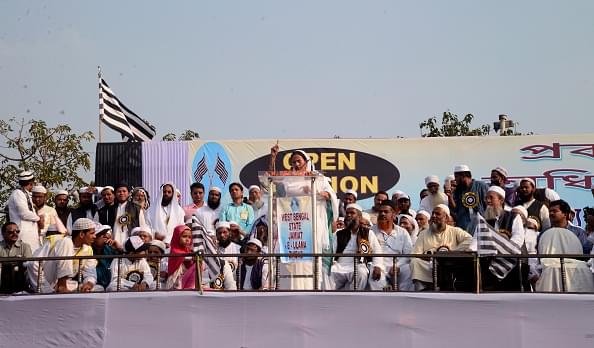
This policy of appeasement has included turning a blind eye to the growth of radicals among Muslims in Bengal. It was under Mamata’s watch that the Indian Mujahideen (IM) and other militant Islamist organizations, including the Jamaat-ul-Mujahideen Bangladesh (JMB), established bases in Bengal and started indoctrinating Muslim youth. According to senior police officers, the state intelligence apparatus sent many alerts to the state home secretary and the police top brass, but Mamata prevented the state machinery from acting for fear of antagonizing the powerful Muslim clergy.
The Khagragarh blast at Burdwan on October 2, 2014, blew the lid off on the presence of Muslim terrorist organizations and modules in Bengal. What followed was a series of arrests. Since then, central agencies, including the National Investigation Agency, have been nabbing many radicalized Muslim youth and JMB and IM operatives from the state. Even supporters of the Islamic State (IS) have been, and are being, arrested from Bengal.
But what is of concern is that Mamata has not reversed her policy of appeasement; she has promised more doles for the minority community and has been pandering to the selfish demands of the self-styled leaders of the community and influential Islamic clerics.
To keep others happy, Mamata has been handing out a slew of doles starting from rice at Rs 2 a kg to grants of Rs 2 lakh to thousands of “clubs” all over the state who are now expected to garner votes for the Trinamool from their respective neighborhoods. All this has, understandably, left the state coffers empty and the financial position of Bengal is more precarious now than what it was five years ago. The absence of any fresh investments and continuing industrial decline has led to rising unemployment.
This has resulted not only in a sharp upward movement of the crime graph, but also a phenomenal rise in the number of micro and mini “enterprises” like cigarette stalls and roadside vendors selling puffed rice and fritters (a favorite Bengali snack) which, at the end of the day, do not contribute anything to the state’s economy. It is a sad joke that Mamata cites these mushrooming, subsistence-level “enterprises” to buttress her point that businesses are flourishing in Bengal under her.
Destroying The Police Force
Perhaps the greatest damage Mamata Banerjee has inflicted on Bengal is the destruction of the self-respect and morale of the police force along with the complete politicization of the administrative machinery and the subversion of many institutions, including academic institutions. True, the Left had initiated all these processes. But it is Mamata who has taken them forward with immense cynical gusto. The police are today not authorized to even arrest criminals on their own without the express approval of Trinamool functionaries.
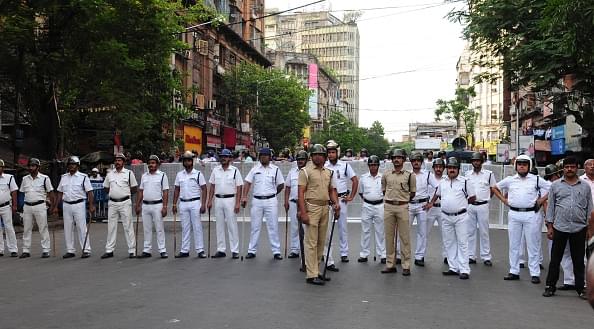
Trinamool-backed criminals and goons assault policemen at will.
It is the Chief Minister herself who showed the way by storming into a police station in the heart of Kolkata late one evening in November 2011 and setting some arrested party-men free. Since then, innumerable police stations in Bengal have been attacked and arrested criminals freed. The police force in Bengal has been left totally demoralized. The state administrative machinery is rudderless and even senior bureaucrats are too scared to act on their own.
Bengal is, without doubt, one of the most poorly administered states in the country. And the autonomy of all educational institutions has been compromised. Political violence, the lasting legacy of the Left, has reached a new high under Mamata. If the Left targeted political opponents, the Trinamool targeted its own electoral ally—the Congress—soon after the alliance won the 2011 polls. Congress leaders, activists and supporters were beaten and rendered homeless by Trinamool cadres and many forced to join the ranks of the Trinamool.
Mamata showed a greater intolerance for opposition than the Left and, in a bid to strengthen her own party and leave no space for any non-Trinamool entity in Bengal’s polity, took on her own ally and a party that she once belonged to (the Congress). Many Congress leaders were enticed or forced to join the Trinamool, and the result today is that Mamata is faced with an alliance of the Left and the Congress. Opportunistic this alliance may be, but it reflects the desperation of both parties to stay alive. They have realized that if they don’t join hands and weaken the Trinamool, they will be wiped off the political landscape of Bengal.
While it is much too early to predict the outcome of the forthcoming Assembly polls, which will only be known on May 19, it can be safely said that this Congress-Left alliance could prevent a total Trinamool walkover in the elections. Which would be a good thing for Bengal since that could prevent, even if to a very small extent, Mamata and her men from wreaking further havoc on the state.
Jayant Chowdhury is an avid observer of and commentator on politics and society in Bengal and eastern, including north-eastern, India.





